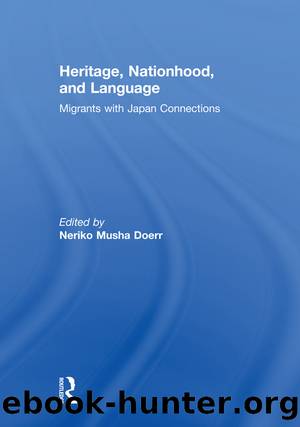Heritage, Nationhood, and Language by Neriko Musha Doerr

Author:Neriko Musha Doerr [Doerr, Neriko Musha]
Language: eng
Format: epub
ISBN: 9781317982630
Barnesnoble:
Publisher: Taylor & Francis
Published: 2014-01-02T00:00:00+00:00
Language and Assimilation in the United States
How Japanese Americans refashion themselves in Japan through language is dependent on the history of language politics in the United States as much as it is on language ideologies in Japan. Social scientists have often used âlanguage shiftâ toward English among immigrant and minority ethno-linguistic communities in the United States as an indicator and measure of their assimilation, along with other demographic data such as rates of intermarriage, class status, and spatial dispersal.5 Sociolinguists have observed a pattern among many immigrant and ethno-linguistic communities in the United States of language shift toward English over the course of three generations.
[T]he typical pattern has been for the first generation to learn enough English to survive economically; the second generation continued to speak the parental tongue at home, but English in school, at work and in public life; by the third generation, the home language shifted to English, which effectively became the mother tongue for subsequent generations.6
From an anthropological perspective, this pattern, while generally descriptive, is also deterministic. It neglects to consider the contingencies of particular cultural, historical, and political contexts, such as the effects of education and immigration policies. Nor does this model account for discourses and language ideologies generated about specific minority groups in relation to the nation. Such meta-linguistic discourses not only articulate minority and national identities, they also shape the emotional valence that heritage language speakers develop for their heritage language.
This dimension of language shift is particularly salient for Japanese Americans who have been less successful than other minoritized ethnic populations at heritage language maintenance. Japanese Americans, in addition to being cast as âperpetual foreigners,â have been deeply affected by the collective memory of internment during World War II. And prior to World War II, widespread anti-Asian sentiment and legislation severely limited opportunities for Japanese Americans in the United States.7 Even those born and raised in the United States and who were university educated during the first half of the twentieth century found few career options outside of Japanese American communities and support networks. Explanations of language shift among Japanese Americans also must acknowledge the profundity of the rupture of World War II and its aftermath for Japanese Americans, as Toyotomi Morimoto as done in his historical study of language maintenance among Japanese Americans.8 Morimoto describes the vibrant and committed efforts of Japanese American heritage language education in the communities prior to World War II. If one is to accept that language shift among Japanese Americans has made it so that they can no longer be considered an ethno-linguistic community, then the specific historical context of war, displacement, and anti-Japanese sentiment along with economic struggles to rebuild livelihoods must be considered as factors in the failure of Japanese language maintenance in the United States. For example, after their release from internment camps, former Japanese American communities along the west coast never completely regained their former strength, presence, or vitality.
The overwhelmingly dominant wartime and postwar discourse pressuring Japanese Americans to disavow cultural affiliation with Japan played no small part in Japanese language shift among Japanese Americans.
Download
This site does not store any files on its server. We only index and link to content provided by other sites. Please contact the content providers to delete copyright contents if any and email us, we'll remove relevant links or contents immediately.
| Anthropology | Archaeology |
| Philosophy | Politics & Government |
| Social Sciences | Sociology |
| Women's Studies |
Cecilia; Or, Memoirs of an Heiress — Volume 1 by Fanny Burney(32538)
Cecilia; Or, Memoirs of an Heiress — Volume 2 by Fanny Burney(31935)
Cecilia; Or, Memoirs of an Heiress — Volume 3 by Fanny Burney(31925)
The Great Music City by Andrea Baker(31911)
We're Going to Need More Wine by Gabrielle Union(19032)
All the Missing Girls by Megan Miranda(15925)
Pimp by Iceberg Slim(14476)
Bombshells: Glamour Girls of a Lifetime by Sullivan Steve(14046)
For the Love of Europe by Rick Steves(13866)
Talking to Strangers by Malcolm Gladwell(13341)
Norse Mythology by Gaiman Neil(13332)
Fifty Shades Freed by E L James(13228)
Mindhunter: Inside the FBI's Elite Serial Crime Unit by John E. Douglas & Mark Olshaker(9313)
Crazy Rich Asians by Kevin Kwan(9271)
The Lost Art of Listening by Michael P. Nichols(7486)
Enlightenment Now: The Case for Reason, Science, Humanism, and Progress by Steven Pinker(7303)
The Four Agreements by Don Miguel Ruiz(6739)
Bad Blood by John Carreyrou(6609)
Weapons of Math Destruction by Cathy O'Neil(6260)
